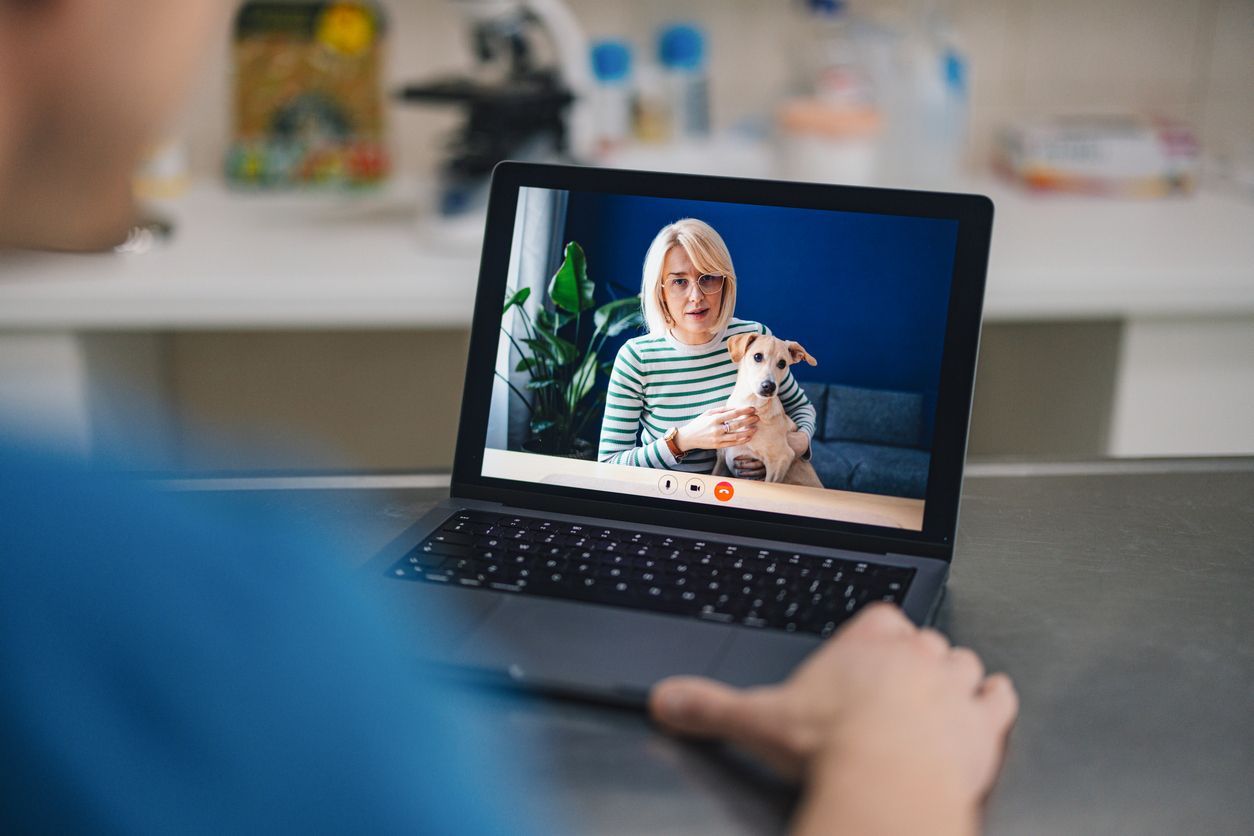How to tell if your kitten or puppy is blind

Disclaimer: This article, its content and related references do not constitute veterinary advice and should not be considered a substitute for veterinary care. If your pet is showing any symptoms that could indicate a medical emergency, please seek immediate emergency care.
Newborn kittens and puppies are blind because they don’t open their eyes until approximately two weeks of age. Their ability to see clearly gradually develops as they grow. Blindness is uncommon in puppies and kittens but can occur due to congenital defects, injuries, and various diseases. Read on to learn more about:
- Signs of blindness in puppies and kittens
- How puppies and kittens become blind
- How a veterinarian tests vision and treats blindness
- How to care for a blind puppy or kitten
If your puppy or kitten is particularly clumsy, it’s normal to worry about their vision, but blindness is uncommon, especially if there are no physical abnormalities in the eyes. Testing a puppy or kitten for blindness involves an eye examination and various tests that isolate their sense of sight by excluding their senses of smell and touch. Treatment options for vision loss in young pets vary depending on the underlying cause, such as retinal detachment or eyelid malformation. If you do have a blind puppy or kitten who’s otherwise healthy, they can live normal and happy lives.
Common signs of blindness in puppies and kittens
Visual impairment in dogs and cats is a spectrum, from being partially sighted to completely blind. One or both eyes can be affected. However, behavioral signs of blindness usually aren’t noticeable unless both eyes are significantly affected. Puppies and kittens can be born with eye conditions that lead to gradual blindness, be born with a problem that interferes with normal vision, or become suddenly blind due to an illness or injury. Blindness in young pets is uncommon, and it’s rare for a blind puppy or kitten to have no physical signs of eye issues.
What does a blind puppy or kitten look like?
Blind kittens and puppies can look completely normal and have no obvious signs of blindness. However, it’s rare for there to be no physical signs that something is wrong with their eyes. Physical signs of blindness include:
- Cloudy eyes
- Eyes that are too small
- Physical abnormality of the iris or pupil
- Eyelids that don’t open as expected
Newborn kittens and puppies are born blind with fused eyelids. It can take approximately two weeks for their eyes to open. Talk to a veterinarian if your puppy’s or kitten’s eyelids remain fused after two weeks and never attempt to open the eyelids yourself.
How do blind puppies and kittens behave?
Behavioral signs of vision loss in puppies and kittens include:
- Bumping into furniture
- Walking off of edges, apparently unaware of them
- Reluctance to jump on furniture
- Appearing lost
- Not reacting to visual stimuli, such as toys
- Difficulty finding a litter tray
Puppies and kittens are often clumsy as they grow, so bumping into objects or falling off of furniture isn’t always a sign they can’t see. Likewise, appearing uninterested in a toy or other object doesn’t necessarily mean they can’t see it.
Why a puppy or kitten might be blind
In some puppies and kittens, eyesight never develops due to a developmental issue or congenital defect. Others may become blind early in life due to an illness or eye injury.
Congenital and inherited eye disorders
Puppies and kittens may be born with normal vision but carry an inherited disease that will eventually lead to loss of vision, such as progressive retinal atrophy. Retinal diseases are among the most common causes of vision loss in adult dogs.
Although birth defects that interfere with the ability to see are uncommon, any part of the eye may develop abnormally in the womb and subsequently interfere with normal vision. Developmental eye conditions include:
- One or both eyes are too small (microphthalmia)
- Hole in the iris (iris coloboma)
- Opacities in the lens (cataracts)
- Absence of the iris or pupil
Structural abnormalities within the eye can also lead to increased pressure within the eye, or glaucoma. A puppy or kitten may be born with glaucoma and develop vision loss early in life. Like retinal diseases, glaucoma occurs more commonly in older cats and dogs, but it is possible for a kitten or puppy to be born with it.
Infectious disease or injury early in life
Injuries and illnesses that affect the eyes can cause permanent damage, leading to permanent blindness. Common injuries to the eyes in puppies and kittens include:
- Corneal ulcerations or scratches
- Exposure to irritating and caustic chemicals
- Facial burns
- Forcing the eyes to open too early
Puppies and kittens are susceptible to various infectious diseases, but common diseases vary between canines and felines. Eye damage in kittens is often a result of an upper respiratory tract infection, such as those caused by:
- Feline herpesvirus
- Chlamydia
- Feline calicivirus
- Mycoplasma
Infectious diseases that can affect a puppy’s eyesight include:
Always consult a veterinarian right away if your young pet has symptoms such as coughing, sneezing, eye discharge, nasal discharge, vomiting, diarrhea, or lethargy.
How vets diagnose and treat blindness in puppies and kittens
A complete eye examination can tell a veterinarian how healthy a pet’s eyes are and how well they can see. Vets use multiple tests and instruments to check various responses and the health of different parts of the eye. “Waving a hand in front of the face of a puppy or kitten is not an effective way to evaluate their ability to see,” explains Dr. Jo Myers, a veterinarian on Vetster. “This type of action is detected by their sense of smell and the movement of air against sensitive whiskers. Vision tests need to be silent and limit the ability to use other senses such as smell and touch to be accurate.”
Veterinarians measure vision in puppies and kittens with:
- Retinoscopy (using a light to measure the retina’s reflection)
- Moving a silent item that doesn’t have a strong scent, such as a cotton ball or laser pointer, in the field of vision to check for a reaction
- Maze test (objects without a strong scent are used to create an obstacle course to see if an animal will go around them)
If poor vision is detected, additional diagnostic testing may be recommended to determine the underlying cause. Possible diagnostic testing your vet may recommend includes:
- Bloodwork and infectious disease testing
- Bacterial or fungal cultures
- Diagnostic imaging
- Cytology
- Biopsy
Puppies and kittens can be partially or completely blind in one or both eyes. Prognosis and the ability to restore sight depends on the underlying cause of the vision impairment. Treatment options may include:
- Eye or oral antibiotics, antifungals, antivirals, or anti-inflammatories
- Treatment of any underlying infectious disease
- Medications and procedures to facilitate the healing of injuries
- Surgery
Blindness can’t always be cured in puppies and kittens. However, most blind pets have a good quality of life if they’re otherwise healthy.
How to help your blind puppy or kitten
If your pet’s eyesight can’t be restored, there are many ways you can help them adapt and stay safe in their environment:
- Supervise blind pets when indoors
- Put baby gates at the top and bottom of any stairs
- Keep dogs leashed when outdoors
- Keep cats indoors
- Use verbal cues for training
- Announce yourself when entering a room or before touching your pet
Pet owners can talk to trainers for advice on how to train a blind puppy and how to safely socialize them. Most blind puppies and kittens grow up healthy and otherwise normal. If you’re concerned about your puppy or kitten’s vision, you can talk to an online vet through the Vetster platform for advice.
FAQ - How to tell if your kitten or puppy is blind
Can kittens recover from blindness?
Kittens can lose vision due to diseases, congenital defects, and eye injuries. Some causes of blindness can be treated, while others result in permanent blindness. However, blind kittens can lead happy and normal lives if they’re otherwise healthy.
How does a blind puppy act?
Blind puppies often bump into furniture, appear lost, and fall off of edges without appearing aware of them. However, puppies are clumsy as they grow, and these behaviors don’t necessarily indicate they’re blind. It’s rare for blind puppies to have behavioral signs without also having visible changes to their eyes.
How do I know if my puppy or kitten has vision problems?
Kittens and puppies are born blind and slowly gain the ability to see as they grow. Blind puppies and kittens usually have physical signs, such as cloudy eyes, eyes that are too big or small, or eyelids that are still fused after three weeks of age. It’s very rare for puppies and kittens to have behavioral signs of blindness without also having physical signs in their eyes.










